The Myantispyware team has discovered the EcoWarm heater scam targeting unsuspecting consumers online, particularly through misleading Facebook ads. This scam promotes a so-called “revolutionary” portable heater that supposedly saves energy and heats rooms quickly. The scam is set up to lure people in with claims of eco-friendliness and massive discounts.
EcoWarm scammers use enticing ads and fake reviews to present the heater as a must-have gadget. They create a false sense of urgency by stating there are limited units available, which pushes people to make quick purchases without thinking.
Once someone goes to the website, they see claims like “over a million units sold” and “256-bit SSL Encrypted Checkout” to gain trust. However, the truth is different. Real customer experiences are absent, and investigations reveal identical products on other sites like AliExpress for much lower prices.
💡 If you have been exposed to such ads or suspect you’ve been scammed, it’s crucial to act quickly. Avoid making any purchases from the site. If you’ve already ordered, contact your payment provider immediately to dispute the transaction. Also, report the scam to authorities to help raise awareness and protect others. Stay cautious and double-check online deals to protect your money and information.
Table of Contents
🚨 Is EcoWarm Heater a Scam?
Yes, the EcoWarm Heater is a scam. EcoWarm is marketed as an eco-friendly heating device engineered by a jet engineer, claiming disruptive effects on the heating industry. Such claims are typical of online scams, employing exaggerated promises and misleading marketing tactics that create a false sense of urgency and innovation.
Key Red Flags:
- 🌐 Unrealistic Promises: The device claims to heat rooms instantly using significantly less energy, which is unlikely and lacks verification.
- 💸 Misleading Discounts and Offers: The product is consistently advertised with a 50% discount and claims of limited availability, intended to pressure customers into making quick purchases.
- ⭐ Fake Reviews and Ratings: Despite claims of high customer satisfaction and reviews, external sites like Trustpilot show no reviews, suggesting that the positive feedback on their site might be fabricated.
- ⚖️ Questionable Claims: The advertised rapid heating capabilities and energy efficiency are doubtful and unsupported by credible evidence.
- 🛠️ Technological Inconsistencies: Claims of using advanced technology to achieve better heating are not backed by verifiable information or technological details.
- 🔒 Lack of Transparency: The use of privacy services to obscure domain ownership details further questions their credibility and transparency.
In summary, the EcoWarm 🚨 is a scam. It employs deceptive tactics, from unrealistic energy efficiency claims to unverifiable customer testimonials. The presence of these red flags strongly indicates that the product is unreliable and potentially fraudulent, targeting consumers looking for efficient and economical heating solutions. Consumers are advised to be cautious and look for more credible products.
🕵️♂️ How the ‘EcoWarm Heater’ Scam Works
The EcoWarm Heater is undoubtedly a scam. 🚨 It involves selling a basic electric heater as a revolutionary eco-friendly device with capabilities that are grossly overstated. 🔗 Step-by-Step Breakdown of the Scam:
🛒 Sourcing Generic Products
The scammers source basic electric heaters at very low prices, often from mass suppliers on platforms like AliExpress. These heaters are far from the innovative products they are marketed as.

🕸️ Creating Misleading Websites
They create websites that look professional but are deceptive, using generic templates and offering minimal contact options, lacking credible social media presence or reliable ways to get in touch.
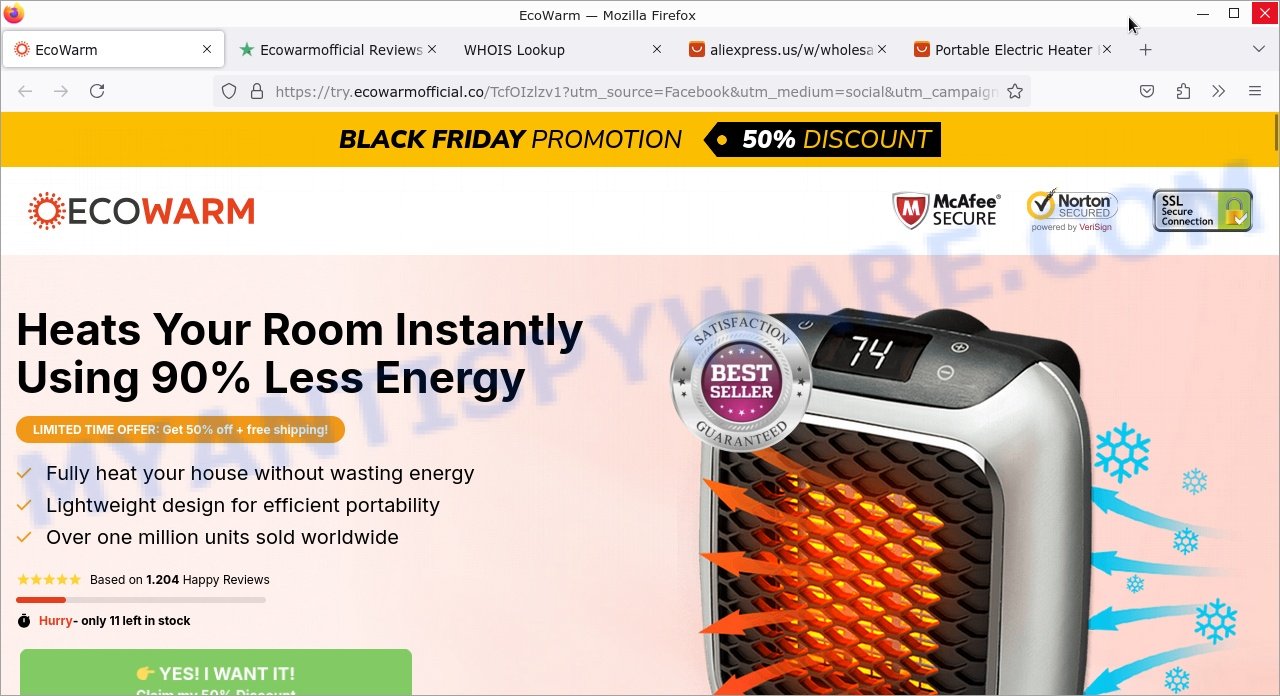
📢 Using Deceptive Advertising
Eye-catching ads are placed on social media platforms like Facebook, promoting large discounts like “50% off” and using phrases like “Slash your heating costs” to capture interest. The ads claim the heaters use advanced technology to provide fast, efficient heating.
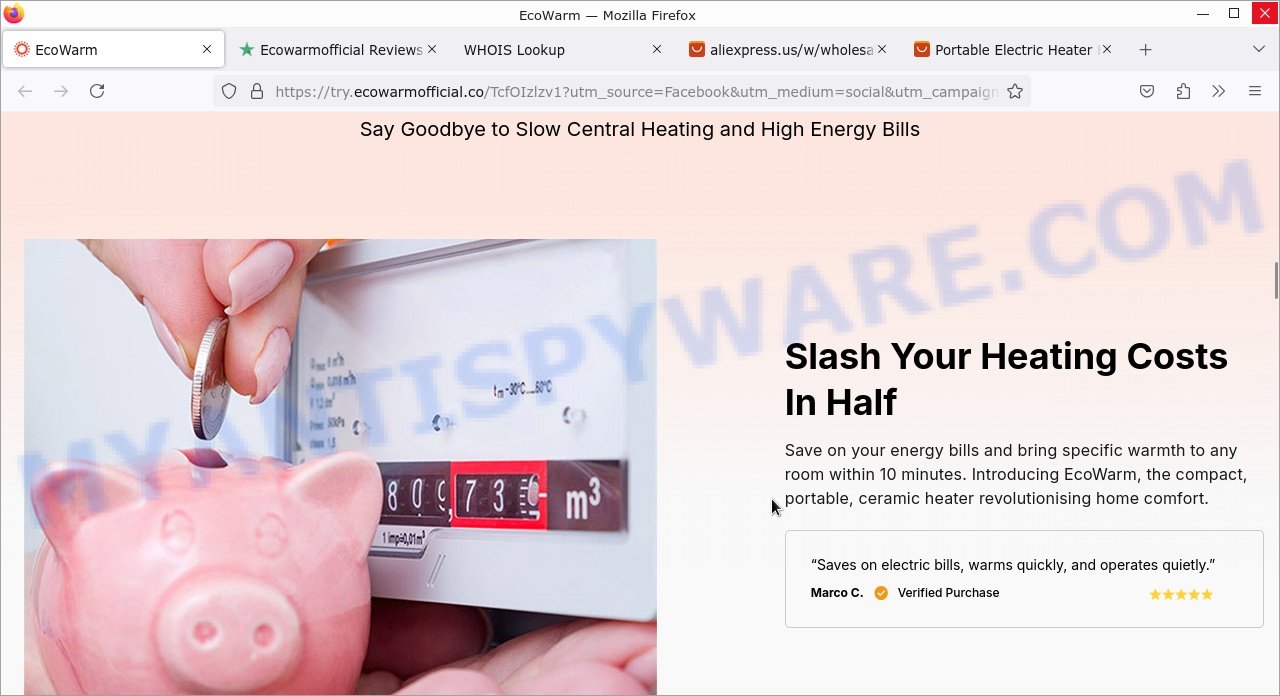
💼 Fabricating Technological Claims
The advertisements falsely assert that the EcoWarm Heater can quickly heat rooms with energy-efficient technology, suggesting features that are either exaggerated or completely fictitious.
💸 Promoting Unrealistic Discounts
Potential customers are enticed with significant discounts, displaying a heavily reduced fake original price to create a sense of urgency and a good deal.
🌟 Showcasing Fake Reviews
The websites typically show fraudulent customer reviews and testimonials. These reviews are overly positive, boasting high ratings, and include made-up success stories.
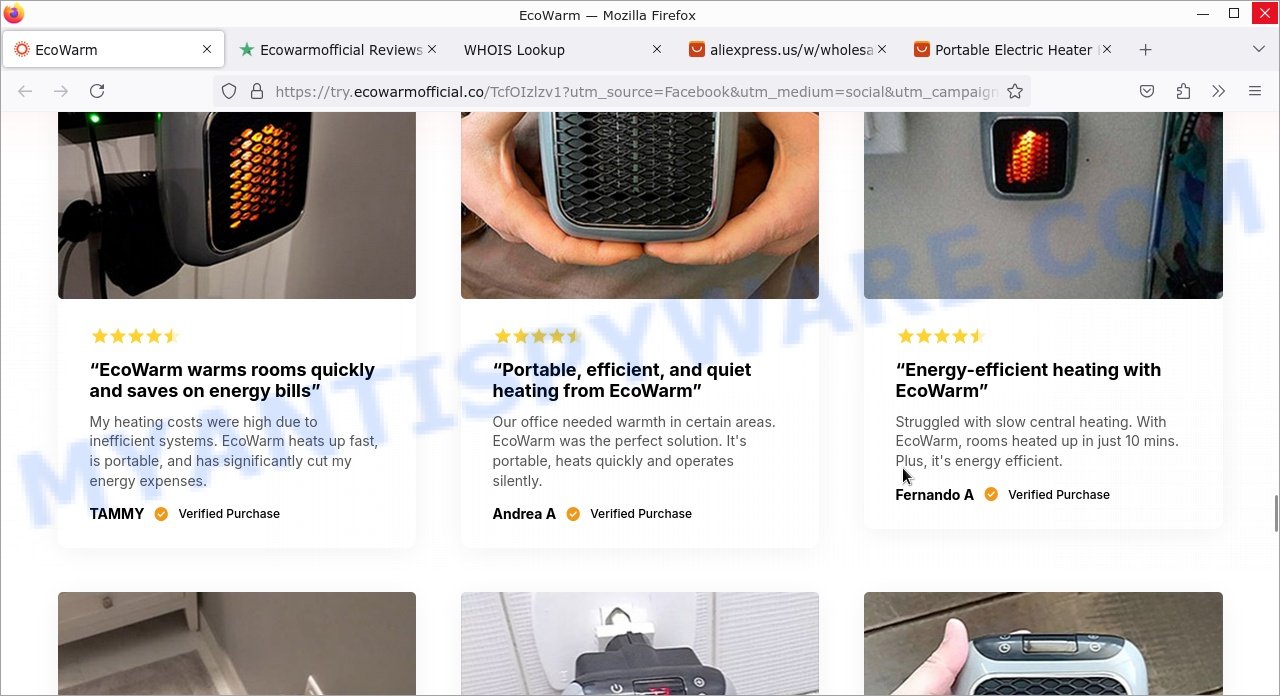
⚖️ Offering False Legal Assurances
The promotional materials and website mislead customers about the legality and efficacy of the heater, despite its inability to perform as advertised.
🛍️ Streamlining the Purchase Process
The buying process on these websites is designed to be quick and straightforward, often requiring customers to pay upfront with payment methods that offer little to no buyer protection.
🔁 Ignoring Return Policies
Although they promise return policies and money-back guarantees, such commitments are seldom honored. Customers find it difficult to return the product or get a refund after discovering its true nature.
📦 Delivering Disappointing Products
Customers do receive an item, but it’s just a basic electric heater that does not live up to the advanced heating capabilities advertised.
🚫 Providing Inadequate Customer Support
After purchase, customers seeking assistance or refunds often encounter poor customer support. The provided contact emails are either non-responsive or offer little help, leaving customers frustrated and without options.
In summary, the EcoWarm Heater 🚫 scam tricks people into buying a simple product by falsely advertising it as a high-tech, energy-efficient heating solution. The scammers use misleading websites, overstated claims, substantial discounts, and fabricated reviews to sell their product. Buyers end up with a basic electric heater that fails to meet the promised heating efficiency, and they often struggle to receive effective support or a refund. This scam highlights the importance of being cautious and doing thorough research before making online purchases of technological products.
🤔 Why Such Scams Are Possible
Quick Profit Motive
Scammers are in it for the quick buck. They don’t care about long-term consequences because they usually disappear before anyone catches on.
Limited Oversight on Ad Platforms
While social media websites have policies against scams, the sheer volume of ads makes it challenging to police every single one. Scammers take advantage of this gap to promote their fake products.
🧠 Human Psychology
Scammers know that people are looking for quick, easy solutions to their problems. The desire for an immediate fix can sometimes cloud judgment, making individuals more susceptible to scams.
⚖️ Lack of Legal Consequences
In many cases, these scammers operate across international borders, making legal pursuit complicated and unlikely. This reduces the risk for scammers, encouraging such fraudulent activities.
👤 Anonymity on the Internet
It’s easy for scammers to hide their identity online. A fake name, a throwaway email address, and they’re in business. This makes it hard to trace and take down these fraudulent schemes.
💡 Beware of Similar Devices
It’s not just the EcoWarm Heater Device you need to watch out for; there are other products claiming extraordinary benefits that often turn out to be scams. Here are some similar products to be wary of:
StopWatt
This device claims to reduce your electricity bill by optimizing your energy usage. It often comes with a money-back guarantee to appear more trustworthy. But consumers have reported either no change or an increase in their energy bills after using it.
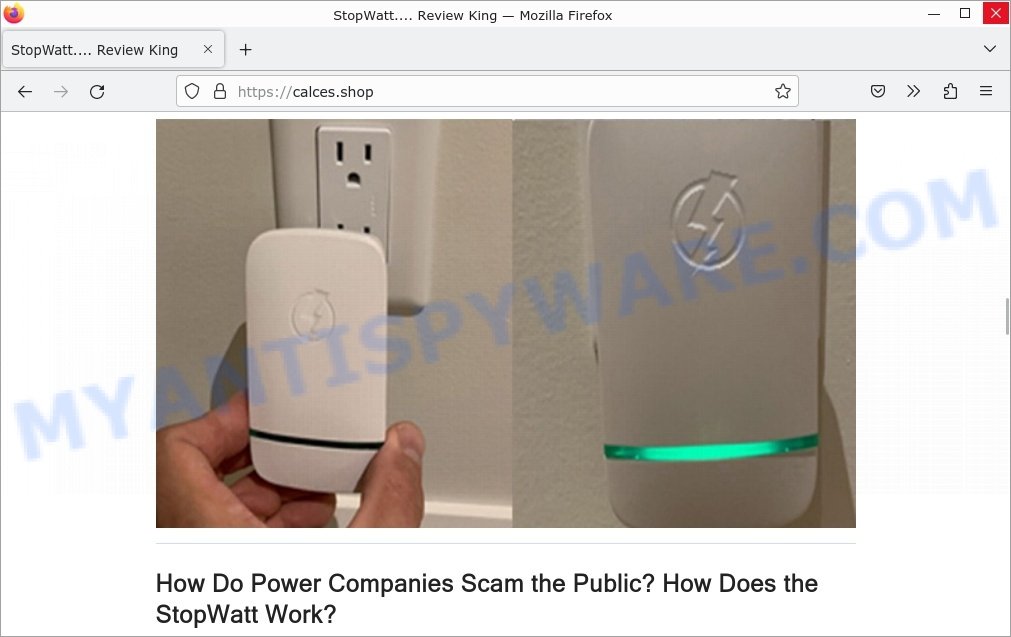
MileMax Fuel Saver
This product promises to drastically improve your car’s fuel efficiency using a “revolutionary chip”. It boasts a hassle-free installation and quick results, but there’s no verified data to back these claims. Plus, messing with your vehicle’s electronics can be risky and void your warranty.
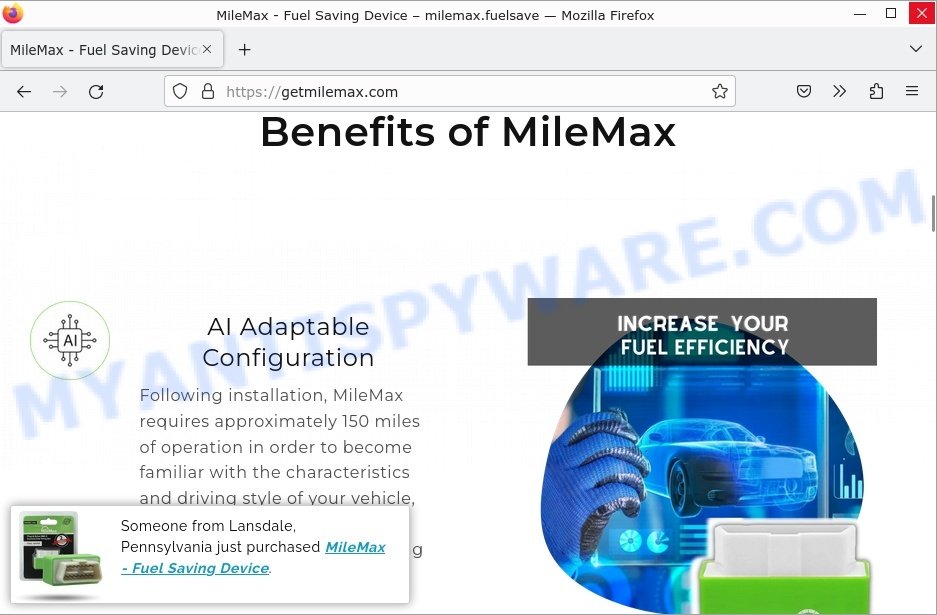
Electromagnetic Antifreeze Snow Removal
This device claims to use “advanced electromagnetic technology” to remove snow and ice effortlessly. Like the AEXZR, it employs scientific jargon to confuse and lure potential buyers, but there’s no substantial evidence to support its claims.

ChillWell Portable AC
This portable air conditioner claims to cool down your room in minutes using “rapid cooling technology”. It often comes with a flashy website and fake reviews to make it seem legitimate. However, similar devices have been found to be mere humidifiers or fans with no real cooling capabilities.
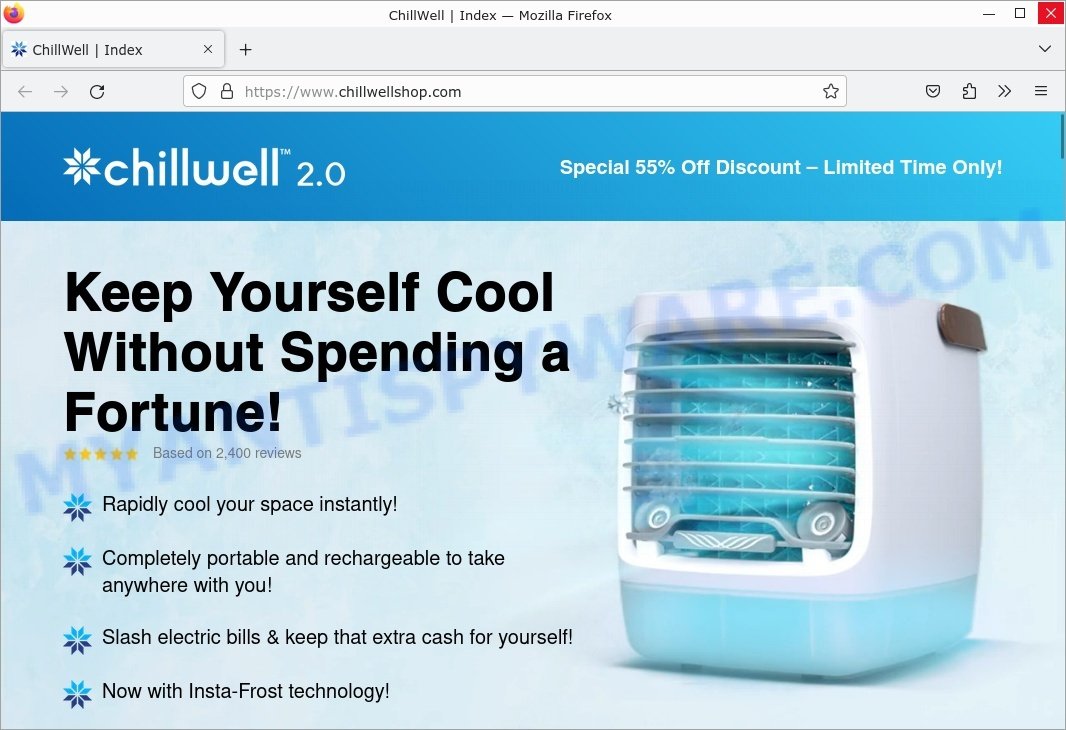
These products share common red flags:
🚩 False Science: They use scientific-sounding language that lacks credible backing.
🚩 Fake Reviews: Customer testimonials often seem scripted and too good to be true.
🚩 Pressure Tactics: Limited-time offers and countdown timers urge quick purchasing decisions.
🚩 Unclear Contact Information: They provide an email or an address often linked to fraudulent activities.
😱 What to Do If Scammed
If you find yourself ensnared by the EcoWarm Heater Device Scam, immediate action is crucial. Here’s what you should consider doing:
🛑 Stop Further Transactions
The first step is to halt any additional transactions that might be in process. Contact your bank or credit card provider and inform them that you’ve fallen victim to a scam. They can help by blocking the card or reversing any unauthorized transactions.
📞 Report the Fraud
File a report with your local police and provide all the available evidence, such as screenshots, emails, and website URLs. Additionally, report the scam to online portals like the Better Business Bureau (BBB) at www.bbb.org or the Federal Trade Commission (FTC) at reportfraud.ftc.gov. If you’re in another country, reach out to your national consumer protection agency.
💻 Take Screenshots
Before the scam website gets taken down or changes, make sure to capture screenshots of your transactions and communications. These can serve as evidence if you decide to pursue legal action.
⚖️ Consult Legal Advice
Speak to a legal advisor about your situation. While pursuing legal action may be time-consuming and costly, it could be a possible avenue for recovering your lost money.
📢 Share Your Experience
Use social media platforms to share your experience and warn others about the scam. Your story could prevent someone else from falling victim to the same or similar scams.
Summary Table
| Factor | Observations | Impact on Legitimacy |
|---|---|---|
| Product Description | Marketed as an eco-friendly portable heater disrupting the industry. Claims fast and efficient heating with minimal energy use. | Negative (Exaggerated claims lacking scientific backing and detailed specifics) |
| Reviews | Website features excessively positive reviews; however, no corresponding reviews found on TrustPilot or major review sites. Reviews seem fabricated. | Negative (Discrepancy between claimed reviews and absence on independent platforms suggests non-authentic reviews) |
| Marketing Channels | Primarily promoted through social media ads with urgency tactics like limited time offers and low stock alerts. | Negative (Use of pressure sales tactics and misleading advertisements) |
| Price | Advertised at 50% off during sales, suggesting a high markdown from an inflated original price, making the product appear more valuable. | Negative (Pricing strategy appears manipulative and inconsistent with product value) |
| Real Functionality | Claims to be based on advanced heating technology but likely similar to common electric heaters found at a lower price elsewhere. | Negative (Overstated functionality that does not align with available evidence) |
| Company Contacts | Contact information is vague with no specific details available; customer service is reportedly unresponsive. | Negative (Inadequate customer support and lack of clear contact details) |
| Power Source | Claims high energy efficiency and reduced consumption without providing substantial evidence or comparative data. |
Conclusion
The EcoWarm Heater is a scam, promising more than it delivers. It boasts of high-tech features that don’t match reality, uses customer reviews that seem scripted and unnatural, and provides vague and unreliable contact information for the company. These are all classic warning signs of a deceptive product.
Bottom Line: Steer clear of this heater. Always research thoroughly before purchasing, especially for items claiming advanced technology at prices that don’t make sense. 🛡️
Stay sharp and think critically; if an offer appears too perfect or the details seem unclear or false, it’s probably a scam. 🤔















